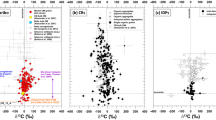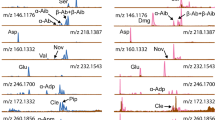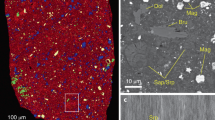Abstract
Much effort has been directed to analyses of organic compounds in carbonaceous chondrites because of their implications for organic chemical evolution and the origin of life. We have determined the isotopic composition of hydrogen, nitrogen and carbon in amino acid and monocarboxylic acid extracts from the Murchison meteorite. The unusually high D/H and 15N/14N ratios in the amino acid fraction (δD = 1,370‰, after correction for isotope exchange; δ15N =90) are uniquely characteristic of known interstellar organic materials. The δD value of the monocarboxylic acid fraction is lower (377‰), but still consistent with an interstellar origin. These results confirm the extraterrestrial origin of both classes of compound, and provide the first evidence suggesting a direct relationship between the massive organo-synthesis occurring in interstellar clouds and the presence of pre-biotic compounds in primitive planetary bodies. The isotope data also bear on the historical problem of distinguishing indigenous material from terrestrial contaminants.1,2.
This is a preview of subscription content, access via your institution
Access options
Subscribe to this journal
Receive 51 print issues and online access
$199.00 per year
only $3.90 per issue
Buy this article
- Purchase on Springer Link
- Instant access to full article PDF
Prices may be subject to local taxes which are calculated during checkout
Similar content being viewed by others
References
Cronin, J. R., Gandy, W. E. & Pizzarello, S. in Biogeochemistry of Amino Acids (eds Hare, P. E., Hoering, T. C. & King, K. Jr) (Wiley, New York, 1980).
Kvenvolden, K. A. et al. Nature 228, 923–926 (1970).
Smith, J. W. & Kaplan, I. R. Science 167, 1367–1370 (1970).
Chang, S. & Mack, R. Lunar planet. Sci. 9, 157–159 (1978).
Becker, R. H. & Epstein, S. Geochim. cosmochim. Acta 46, 97–103 (1982).
Robert, F. & Epstein, S. Geochim. cosmochim. Acta 46, 81–95 (1982).
Yang, J. & Epstein, S. Geochim. cosmochim. Acta 47, 2199–2216 (1983).
Lewis, R. S., Anders, E., Wright, I. P., Norris, S. J. & Pillinger, C. T. Nature 305, 767–771 (1983).
Kerridge, J. F. Earth planet. Sci. Lett. 64, 186–200 (1983).
Cronin, J. R. & Pizzarello, S. Geochim. cosmochim. Acta 50, 2419–2427 (1986).
Yuen, G., Blair, N., DesMarais, D. J. & Chang, S. Nature 307, 252–254 (1984).
Pereira, W. E. et al. Geochim. cosmochim. Acta 39, 163–172 (1975).
Wannier, P. G. A. Rev. Astr. Astrophys. 18, 399–437 (1980).
Penzias, A. Science 208, 663–669 (1980).
Geiss, J. & Reeves, H. R. Astr. Astrophys. 93, 189–199 (1981).
Author information
Authors and Affiliations
Rights and permissions
About this article
Cite this article
Epstein, S., Krishnamurthy, R., Cronin, J. et al. Unusual stable isotope ratios in amino acid and carboxylic acid extracts from the Murchison meteorite. Nature 326, 477–479 (1987). https://doi.org/10.1038/326477a0
Received:
Accepted:
Published:
Issue Date:
DOI: https://doi.org/10.1038/326477a0
This article is cited by
-
Organic Matter in the Solar System—Implications for Future on-Site and Sample Return Missions
Space Science Reviews (2020)
-
Water Reservoirs in Small Planetary Bodies: Meteorites, Asteroids, and Comets
Space Science Reviews (2018)
-
Carbonaceous Chondrite Meteorites: the Chronicle of a Potential Evolutionary Path between Stars and Life
Origins of Life and Evolution of Biospheres (2017)
-
Amino acid compositions in heated carbonaceous chondrites and their compound-specific nitrogen isotopic ratios
Earth, Planets and Space (2016)
Comments
By submitting a comment you agree to abide by our Terms and Community Guidelines. If you find something abusive or that does not comply with our terms or guidelines please flag it as inappropriate.



